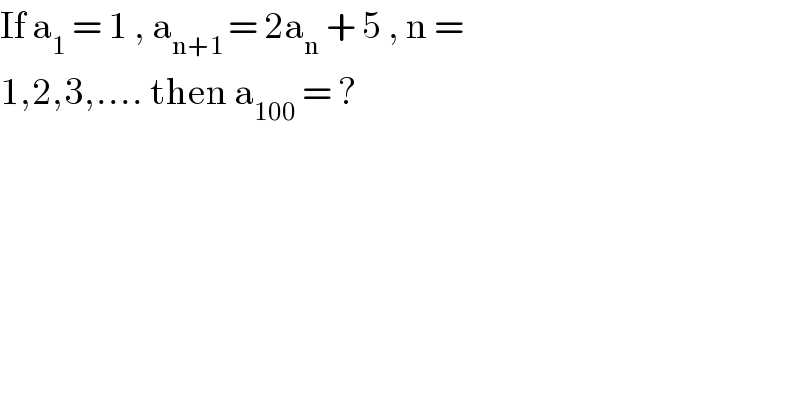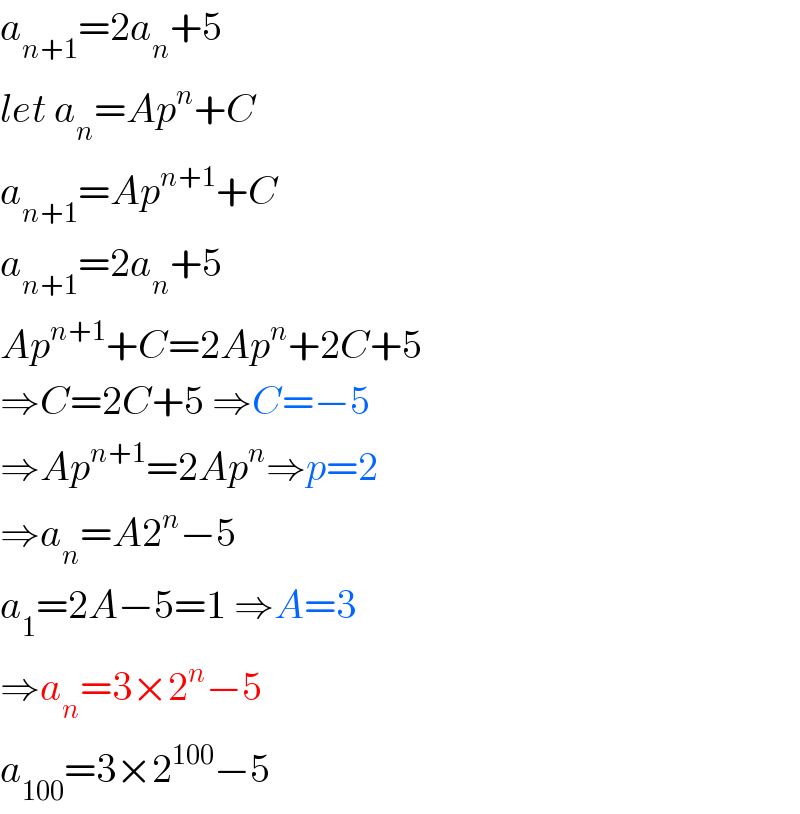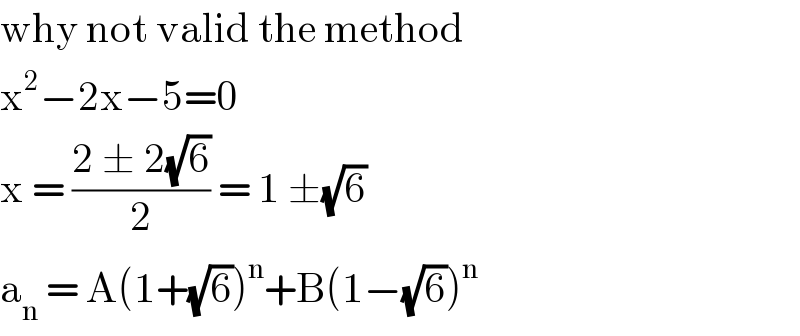
Question Number 87647 by john santu last updated on 05/Apr/20

$$\mathrm{If}\:\mathrm{a}_{\mathrm{1}} \:=\:\mathrm{1}\:,\:\mathrm{a}_{\mathrm{n}+\mathrm{1}\:} =\:\mathrm{2a}_{\mathrm{n}} \:+\:\mathrm{5}\:,\:\mathrm{n}\:=\: \\ $$$$\mathrm{1},\mathrm{2},\mathrm{3},....\:\mathrm{then}\:\mathrm{a}_{\mathrm{100}} \:=\:? \\ $$
Answered by mr W last updated on 05/Apr/20

$${a}_{{n}+\mathrm{1}} =\mathrm{2}{a}_{{n}} +\mathrm{5} \\ $$$${let}\:{a}_{{n}} ={Ap}^{{n}} +{C} \\ $$$${a}_{{n}+\mathrm{1}} ={Ap}^{{n}+\mathrm{1}} +{C} \\ $$$${a}_{{n}+\mathrm{1}} =\mathrm{2}{a}_{{n}} +\mathrm{5} \\ $$$${Ap}^{{n}+\mathrm{1}} +{C}=\mathrm{2}{Ap}^{{n}} +\mathrm{2}{C}+\mathrm{5} \\ $$$$\Rightarrow{C}=\mathrm{2}{C}+\mathrm{5}\:\Rightarrow{C}=−\mathrm{5} \\ $$$$\Rightarrow{Ap}^{{n}+\mathrm{1}} =\mathrm{2}{Ap}^{{n}} \Rightarrow{p}=\mathrm{2} \\ $$$$\Rightarrow{a}_{{n}} ={A}\mathrm{2}^{{n}} −\mathrm{5} \\ $$$${a}_{\mathrm{1}} =\mathrm{2}{A}−\mathrm{5}=\mathrm{1}\:\Rightarrow{A}=\mathrm{3} \\ $$$$\Rightarrow{a}_{{n}} =\mathrm{3}×\mathrm{2}^{{n}} −\mathrm{5} \\ $$$${a}_{\mathrm{100}} =\mathrm{3}×\mathrm{2}^{\mathrm{100}} −\mathrm{5} \\ $$
Commented by john santu last updated on 05/Apr/20

$$\mathrm{why}\:\mathrm{not}\:\mathrm{valid}\:\mathrm{the}\:\mathrm{method} \\ $$$$\mathrm{x}^{\mathrm{2}} −\mathrm{2x}−\mathrm{5}=\mathrm{0} \\ $$$$\mathrm{x}\:=\:\frac{\mathrm{2}\:\pm\:\mathrm{2}\sqrt{\mathrm{6}}}{\mathrm{2}}\:=\:\mathrm{1}\:\pm\sqrt{\mathrm{6}} \\ $$$$\mathrm{a}_{\mathrm{n}} \:=\:\mathrm{A}\left(\mathrm{1}+\sqrt{\mathrm{6}}\right)^{\mathrm{n}} +\mathrm{B}\left(\mathrm{1}−\sqrt{\mathrm{6}}\right)^{\mathrm{n}} \\ $$
Commented by mr W last updated on 05/Apr/20

$${because}\:\mathrm{5}\:{is}\:{a}\:{constant},\:{not}\:{the}\:{coef}. \\ $$$${of}\:{a}\:{xth}\:{term},\:{in}\:{the}\:{recursive}\:{relation}. \\ $$
Commented by john santu last updated on 05/Apr/20

$$\mathrm{oo}\:\mathrm{i}\:\mathrm{understand}\:\mathrm{sir}. \\ $$
